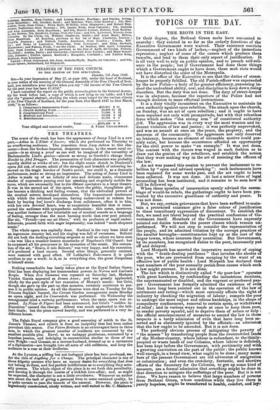THE THEATRES.
The event of the week has been the appearance of Jenny Lind in a new part,—Adina in L'Elisir d' Amore; whi.1 she performed on Thursday to an overflowing audience. The transition from Lucy Ashton to this cha- racter—from the broken-hearted, desperate maniac, to the smart rural co- quette—is as strong a proof as can well be imagined of the versatility of Mademoiselle Linda genius—almost as strong as Garrick's change from Hamlet to Abel Drugger. The personation of both characters was probably equally skilful as works of art; but the slight comic sketch in Donizetti's opera did not, of course, admit of the strength and breadth of colouring be- stowed on the tragic heroine of Scott's novel; nor could it, as a dramatic performance, make so strong an impression. The acting of Jenny Lind in riding is made up of an infinity of nice and delicate traits, evanescent shades of expression passing over her speaking and singularly mobile fea- tures, which are necessarily lost to the distant spectators in a large theatre. It was in the second act of the opera, where the giddy, thoughtless girl, has become a thinking and feeling woman, that the unrivalled powers of the musical actress developed themselves. The impassioned tenderness with which the reformed coquette, having endeavoured to redeem her fault by buying her; lover's discharge from enlistment, offers it to him, with her own devoted heart, was so exquisitely beautiful that it trans- ported the audience with sympathetic enthusiasm: this scene, moreover, was another instance of her inimitable use of musical sounds as a language of feeling, stronger than the most burning words that ever poet penned. Her air, " Prendi—per me sei libero," with its profusion of rapid embel- lishments, poured forth with eager impetuosity, was indeed "most eloquent music."
The whole opera was capitally done. Gardoni is the very bean ideal of an ingenuous country lad, and his singing was full of sweetness. Belletti did not look the dashing recruiting sergeant so well as others we have seen —he was like a weather-beaten moustache of Napoleon's Old Guard: but he surpassed all his precursors in his execution of the music. His restora- tion of the air, "Bravo, il mio Belcore," was very happy, and his execution of it produced a loud encore. Several other things, generally omitted, were restored with good effect. Of Lablache's Dulcurnara it is quite needless to say a word: in it, as in everything else, the great Neapolitan is himself alone.
Nothing remarkable has lately taken place at the Royal Italian Opera. Grisi has been displaying her transcendent powers in Norma and Lucrecia Borgia. When Dun Giovanni was repeated on Saturday last, Madame Viardot Garcia appeared as Donna Anna ; and was greatly applauded, chiefly for the pure style of her execution of Mozart's music: but Grisi, though she gave up the part on that occasion, certainly continues to pos- sess it in public opinion. As all the theatres were shut on Tuesday for the Princess Sophia's funeral, the Covent Garden management made Monday an opera night, and La Cenerentola was performed. On Wednesday the management tried a morning performance; when the same opera was re- peated. Le Nozze di Figaro had been announced, but Grisi's "sudden in- disposition" caused the change. Alboni was much applauded in the bril- liant finale; but the piece moved heavily, and was performed to a very in- different house.


























 Previous page
Previous page